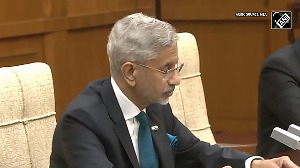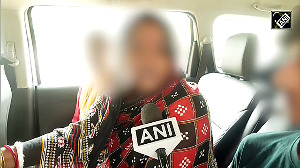We must understand that we live in extremely cynical times. If it is a politician he must be corrupt. If he is a businessman, he must be equally corrupt. Poor Nitin Gadkari, he is a politician and a businessman. That compounded matters for him, says M R Venkatesh.
"Money Laundering." That was the charge a senior journalist levelled at the outset while we discussed the Nitin Gadkari issue. "But have you read the Prevention of Money Laundering Act," I probed him. "No" was his cryptic reply. Surely he did not realise that a charge of laundering is sustainable, if and only if, it is associated with a crime. Crucially, the proceeds of a crime must be passed of as untainted property.
Being technical, this was greeted with silence. Seizing this opportunity I elaborated "to launder money, one must have committed a crime. What is the crime he committed in the first place -- kidnapping, drug peddling or corruption?"
"Corruption" he mumbled and added meekly "that is what Khejriwal says." "Do you realise that Gadkari has not been in power for over 12 years that the charge of corruption, at this distance of time and that too without any evidence, is ludicrous?" I queried. Once again silence.
"As regards land allotted by Maharashtra government for irrigation, it has, in effect been used (through a trust) for the purpose for which it was allotted. Nothing wrong." I elucidated.
"But what if he has worked his way through the state government for the allocation of this land?"
Obviously, in the absence of cogent arguments, my friend was getting vague. "Well in that case, the state government stands condemned first up where even persons of Gadkari's stature had to bribe their way through," I elaborated. "Will the state government inquire this matter?" I queried. More silence followed. Remember, Gadkari is ready for an probe by the Centre or state governments.
"But the maze of transactions, the shell companies, his domestic help being appointed as directors all point to something fishy." From a pointed and serious charge of Money Laundering it had now become "fishy." After tackling the money laundering charge, I began explaining the transactions.
Purti, the company in question and linked to Gadkari, had a paid up capital of Rs 55 crore by 2009, of which, Rs 47.34 crore (say 85% and the bone of contention) was invested by one Mehta group through 12 shell companies. Let us call these companies Block A.
That is not all. Mehta who had originally given his guarantee to financial institutions, substituted his guarantee (on account of some technicality) with that of another 14 shell companies (let us call these companies Block B), which were distinct from the original 12 viz Block A. In short, he is, repeat he is, the owner of Block A as he is of Block B. In short, Mehta used Block A shell companies for structuring their investments into Purti and Block B for structuring their guarantees to financial institutions (FI) for loans taken by Purti.
"Did you get the crux?" I enquired. In response, my friend conceded "Nothing illegal or immoral I guess but I am not comfortable either."
"Remember that the Supreme Court has allowed a person to arrange his affairs as long as they are not illegal" I said and added "Your comfort is irrelevant."
"Is this arrangement an afterthought?" my journalist friend enquired mischievously. "Remember that this issue was settled, not now in 2012, but almost a decade back," I retorted. All these were fully known since then to FI, Registrar of Companies and IT authorities. This is called contemporaneous evidence and obviously has very high evidentiary value.
Further, in a search conducted by the IT authorities on parties concerned, the ownership was conclusively demonstrated to them dramatis personae parties concerned, the ownership of Purti issue was decisively settled in favour of Mehta. This is a crucial issue that media and Gadkari's detractors missed out. Forget technicalities, Mehta invested into Purti over a period of time a decade back, all of which were disclosed to the IT authorities and accepted. This is the crux of the issue that the media and Gadkari's detractors missed out.
Bad luck or bad planning?
While substantial portion of Purti's capital was from Mehta, Gadkari with a mere capital of Rs 100,000 became the face of Purti. Possibly, Purti was his political instrument to nurture his constituency in Vidharbha. Unlike other Maharashtrian politicians who used the co-operative model, Gadkari used a corporate model (Purti).
It is now well known that Purti has in excess of 10,000 farmer-shareholders, a good number of whom were beneficiaries of Purti's intervention in drought stricken, farmer suicide prone backward regions of Vidharbha. One need not be Einstein to figure that if farmers had to benefit (paid more than the minimum support price), someone had to lose equally.
And it was Purti -- the very vehicle that was designed to help farmers by Gadkari had become sick! By 2009, Purti had an accumulated loss of Rs 64 crore. The loans had not been serviced and became bad in the books of the FI. In the process the assiduously built idea constituency of Gadkari ran the risk of imploding.
Purti had to be restructured. For this reason fresh capital was required. Global Safety Vision Limited, another player in this drama, agreed to put Rs 164 crore into Purti in 2009-10. But there was a pre-condition. Mehta had to exit Purti as Global would not fund till he was around. So Mehta effectuated a "theatrical transfer" (a phrase used by S Gurumurthy) of his holdings from Block A shell companies to Block B, which he controlled (through domestic help) if not owned.
Once the money flowed from Global, dues to the FI were settled. "But, did this not prejudice FI? If they had known that probably Mehta was the owner of Block B companies, probably they would not have taken decisions to favour a settlement with Purti?" My friend was trying to play devil's advocate.
"But sir, did I not tell you that the ownership of loan to Purti was guaranteed by Block B shell companies vested with Mehta and was known to concerned all authorities?" Since 2003-04?" "Oh yes" my friend conceded sheepishly. "Is that why you argue that there is no prejudice to FI?" he enquired. "Yes" I replied.
"But was not Global prejudiced, especially more so assuming if Mehta was in effect the owners of Block B shell companies? Importantly, why did Mehta introduce domestic help as directors?" My friend was at his pursuasive best. "To some extent I concede he, Mehta, was probably wrong. But even in your question you have not implicated Gadkari. If that were so why hold Gadkari guilty?" I questioned.
My friend was stumped. He realised his game well and truly over. After all Gadkari was linked to Purti not to the shortcomings in shell companies of Block A or B shell companies! Similarly, all his domestic helps were linked to these shell companies, not to Purti. Either way, the domestic help did not bring any substantial capital that could remotely implicate Gadkari.
Simply put Global gave loans because of Gadkari, not Mehta. In turn Purti remortgaged its assets to Global. This was possible as the market value of Purti's assets skyrocketed. Importantly, it was possible as once their loans were repaid, the FI released lien on assets mortaged with them.
Once these transactions were completed, Mehta once again proclaimed ownership of Purti. "Whatever be it, Mehta short-charged Global" my friend remonstrated angrily. "Probably," I retorted agreed and added "See Gadkari is not involved in all this. If at all it is an issue Mehta and Global without involving Gadkari. Then why hold him responsible? If Gadkari is responsible for the action of his business partner, should not the PM be responsible for the conduct of his colleagues?"
Perturbed at this question my friend interjected "But how genuine is the Global loan?" "You tell me, after all you made the charge of money Laundering," I retorted. "I don't know." He confessed. "Not to worry, Global is part of IRB group -- a separate group," I concluded.
Moral of the story
One thing is certain; it was a war against Gadkari orchestrated from within -- an insider job. That created the "perceptions" in the first place. Sections of the media inextricably became part of this internal squabble within the BJP. That converted perceptions into "charges."
Maze of shell companies, liberal usage of exotic terminologies without understanding it and anchors who held Gadkari guilty first and then began their investigation added to all these. Competitive media converted "charges" into "sensational findings." And now Gadkari's colleagues point to the mess which they created in the first place as a reason for Gadkari to go.
We must also understand that we live in extremely cynical times. If it is a politician he must be corrupt. If he is a businessman, he must be equally corrupt. Poor Gadkari, he is a politician and a businessman. That compounded matters for him.
Press report suggests that the government has initiated some probe through ministry of company law affairs and IT. All these do not suggest the grave charge of money laundering as my friend initially made it out to be. There could be some technical violations by Purti, no doubt, but nothing that criminally implicates Gadkari of money laundering at this point in time.
The lessons of all this is compelling. Some media anchors acted as mercenaries. They carried out a hit and run operation without evidence. When evidence was forthcoming they lacked the basic courtesy to carry out the other side of the story and provide an opportunity to the accused to defend himself.
"Finally do you mean that Gadkari did no wrong?" my beleaguered friend enquired. "I am no one to pass verdict. Consequently, I have laid out facts for you to decide. This is what even the Lord did while delivering ultimate knowledge through Gita (Chapter XVIII) to Arjuna. After all clarifications, he allowed Arjuna to decide his course of action." I rest my case.
The author is a Chennai-based chartered accountant. He can be contacted at mrv@mrv.net.in









